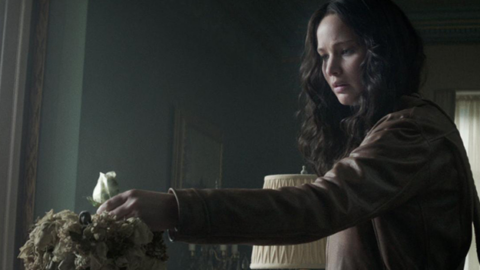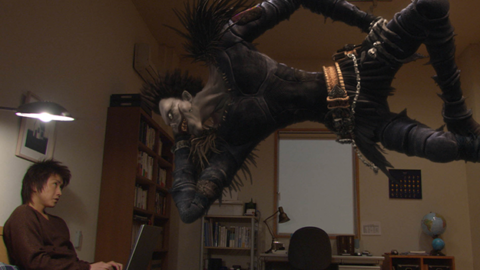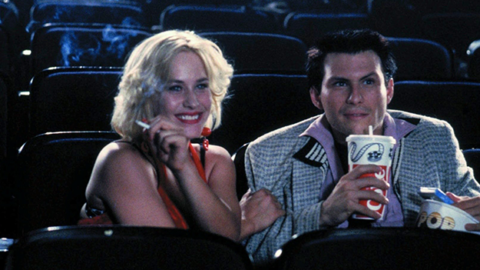Deep Focus: The Hunger Games: Mockingjay Part 2
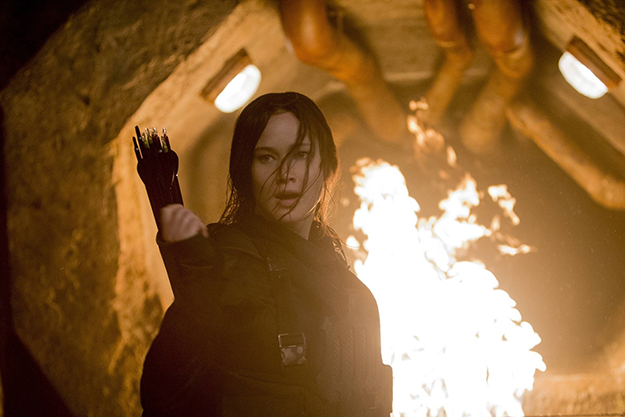
Is there such thing as an “Unspoiler Alert”? Then let this be the first. The crucial thing about The Hunger Games: Mockingjay Part 2, the grand finale of the movie tetralogy based on Suzanne Collins’s print trilogy, is that it doesn’t spoil the saga at its source. This movie completes the odyssey of Katniss Everdeen (Jennifer Lawrence) without an ounce of happily-ever-after. Her psychic scars color even a quiet pastoral finale. Popcorn-movie fans will have to adjust to action that’s audaciously downbeat. All who connect to Lawrence’s Katniss as a complicated protagonist and a mesmerizing presence will embrace this film for making good on her promise to become a unique heroine. At the end, Katniss feels haunted yet fulfilled. Her fans will feel satisfied and whole.
In three previous movies, Katniss acted on sound moral reflex and visceral instinct as she took the place of her younger sister Prim (Willow Shields) in The Hunger Games, then became a reluctant Joan of Arc for the country-wide revolt against the Games’ ultimate impresario, President Snow (Donald Sutherland), the dictator who fills his Capitol with bread and circuses, then treads over the rest of Panem with an iron heel. In the first Mockingjay movie, Katniss could not participate in anti-Snow propaganda unless, like a Method actor under a literal gun, she felt her insurrectionist message and delivered it her way. In the second Mockingjay movie, Katniss is in a different psychic zone. The others still view her as a “Propo” star, but she means to achieve a private objective: assassinating Snow.
Few resistance fighters in movie history have been as determined and alienated as Katniss is here. Her former partner/suitor Peeta (Josh Hutcherson) has been programmed by the Capitol to kill her; her other hometown beau, Gale (Liam Hemsworth), a front-line military strategist as well as a crack warrior, sometimes repulses her with his ends-justify-the means mentality. What makes her dilemma so cinematic is Lawrence’s extraordinary ability to suggest an enigmatic inner life. She emits emotional vibrations that are vulnerable, homicidal, or both at the same time. She’s like a dramatic tuning fork empowering director Francis Lawrence to key into unusual blends of revenge, resolve and remorse in every scene. The filmmaker and his star shoot a lot of arrows en route to Katniss’s goal. Their aim is true.
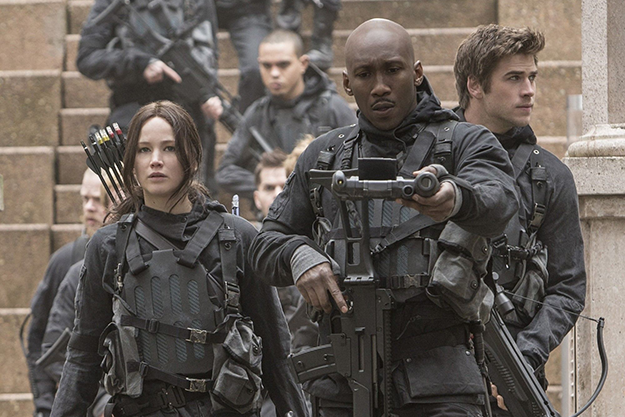
No contemporary “adult” film has been as daring as Mockingjay Part 2 in forcing audiences to confront the manipulative uses of verbal and visual rhetoric. Snow tells the “Loyalists” that rebels hate them because of their easy, comfortable way of life, echoing the words that American politicians use so casually against jihadists. (Historically literate audiences might gasp at the use of Loyalists, the name for the anti-Franco good guys in the Spanish Civil War, to describe the pro-Snow bad guys.) One source of dark humor is the hypnotic impact that screens have on the citizenry, especially in the Capitol, where they light up out of nowhere to proclaim that presidential messages or ideologically slanted battle scenes are “Mandatory Viewing.” Like Jennifer Lawrence, the supporting actors alternate bold and subtle shadings without breaking a sweat. In little more than a beamed-in walk-on, Stanley Tucci is scarily funny as multimedia star Caesar Flickerman, now the sort of breaking-news anchor who can’t disguise his delight at celebrity even when reporting on disaster.
The movie’s absence of self-conscious flash draws you in. Director Lawrence moves confidently between stripped-down close-ups and spectacular ravaged panoramas. In the first half, he achieves a textured sort of tunnel vision. He colors the battle-ravaged world in white-and-ash, and renders action scenes in shades of gray on the moral and the visible spectrum. Katniss learns the risks of performing acts of mercy in a war zone; a near-death experience brings her down so low that execution looks like up to her.
The action becomes even starker and more terrifying as Katniss, going rogue, moves to the battlefields before the Capitol and then into a subterranean network of service roads and drainage tunnels where only savage “mutts” (that is, mutants) seem to be at home. When Katniss and her “star squad” emerge into what looks like an underground shopping-mall garage (watching the film at Century City in Los Angeles, I thought the action had pierced the fourth wall), the splash of color on garish orange bricks is as blinding as a solar flare. Over this epic’s expanse, director Lawrence’s pacing sometimes goes awry, but his vision is rich, and he stays in expressive command of the gaudiest strokes. He introduces the exotic character Tigris (Eugenie Bondurant), a former Capitol stylist surgically enhanced to look like a tigress, with a shock that gives way to intrigue and poignancy. Alfonso Cuaron or David Yates in their Potter films could not have done it better.
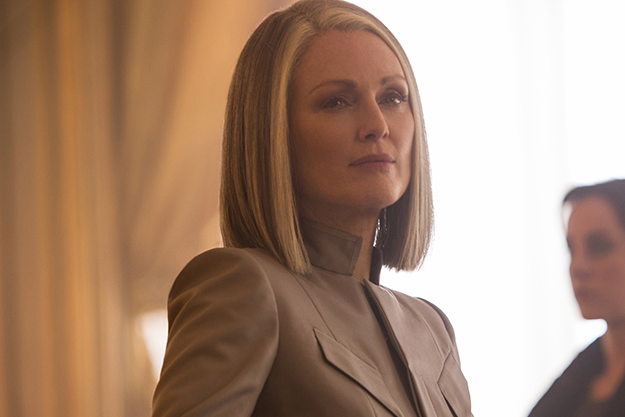
With episodes like that one, The Hunger Games: Mockingjay Part 2 draws on a well of feeling, imagination, and, yes, sensibility that extends beyond the movie screen. The movie, though somber, is not unremittingly grim. At the most unexpected moments, savage comedy erupts to devastating effect. Julianne Moore, once again sensationally cryptic as the rebels’ political leader, District 13 President Alma Coin, begins to betray her true Machiavellian stripes when she mutters, with a hilarious mixture of regret and disdain, that Katniss has become “mythic.” (Philip Seymour Hoffman, in his final screen appearance, responds with a delicious Cheshire Cat smile.) Donald Sutherland is just as eerily meticulous as Snow. When President Coin interrupts one of Snow’s broadcasts and pillories his description of Katniss as a girl “picked” from small-town obscurity, Sutherland, though no viewers can hear him, can’t help correcting her—“plucked,” he says softly. Lawrence herself earns a crowd-pleasing laugh, quipping that she didn’t know she meant so much to Coin.
Jennifer Lawrence’s unifying and protean force elevates the other actors to stay at the top of their game. Jena Malone is so wickedly magnetic as the mischievous and aggressive Johanna because Lawrence demonstrates that Katniss is fascinated by her. This movie never devolves into mere heroine worship. Hutcherson makes good on his chance to modulate his anguish as Peeta, and Hemsworth becomes increasingly appealing as Gale grows into his rueful adulthood. There’s an unusual sophistication to the playing and the staging of the scene when Katniss overhears them talking about their competition for her hand. It’s startling how many characters create bonds of affection with the audience from limited amounts of screen time, including Elden Henson’s mute, giant-hearted Pollux and Sam Claflin’s happy warrior Finnick Odair.
At two hours and 16 minutes, the movie does go on, but its length seems dictated by Francis Lawrence’s determination to give his characters their due. It’s especially telling that when Katniss finally meets her destiny, even readers of the book will experience it as startling and inevitable. The director’s greatest gift to Collins’s readers is to lend her texts, at times prosaic, the glimmer of pop poetry. His and Jennifer Lawrence’s Mockingjay is like Paul McCartney’s blackbird, singing in the dead of night—taking her broken wings and learning to fly. She was only waiting for this moment to arise.



